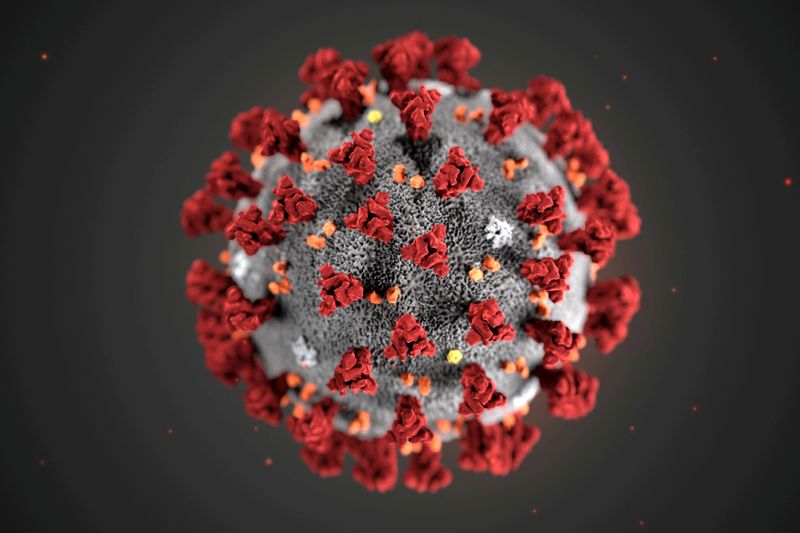By Nancy Lapid
(Reuters) - The following is a roundup of some of the latest scientific studies on the novel coronavirus and efforts to find treatments and vaccines for COVID-19, the illness caused by the virus.
AstraZeneca COVID-19 vaccine shows up to 90% efficacy
An interim analysis of late-stage trials of AstraZeneca's COVID-19 vaccine finds it prevented 70% of COVID-19 cases with no confirmed serious adverse effects, the company announced on Monday. In 8,895 participants who got two full doses, the efficacy was 62%. But due to a dosing error that proved to be a happy accident, among 2,741 volunteers who got a half dose followed by a full dose, efficacy rose to 90%. Pfizer (NYSE:PFE) and Moderna reported that their vaccines were about 95% effective at preventing illness. But AstraZeneca's vaccine is cheaper, easier to make, and can be stored at normal refrigerator temperatures. Investment analysts at SVB Leerink said Astra's vaccine was unlikely to gain U.S. approval because safety data so far are inadequate and the trial design did not meet U.S. requirements for representation of high-risk groups such as the elderly and minorities. AstraZeneca said it plans to seek approval to modify its U.S. study to get more data on the smaller initial dose. Eventually, all three vaccines could prove comparable. "My suspicion is that by the time we are a year down the line, we'll be using all three vaccines with about 90% protection," said immunologist Danny Altmann of Imperial College London. (https://reut.rs/2J5n4Oi; https://
COVID-19 reinfection appears unlikely for at least 6 months
People who have had COVID-19 are unlikely to contract it again for at least six months, British researchers said on Thursday in a report posted on medRxiv ahead of peer review. Between April and November, they tracked more than 12,000 frontline healthcare workers at high risk for infection with the new coronavirus. COVID-19 with symptoms occurred in 89 of 11,052 workers who did not already have antibodies showing exposure to the virus, whereas none of the 1,246 staff with antibodies developed a recurrent infection. Staff with antibodies were also less likely to test positive for COVID-19 without symptoms, the researchers said. "This is really good news because we can be confident that, at least in the short term, most people who get COVID-19 won't get it again," said coauthor David Eyre of Oxford's Nuffield Department of Population Health. Maria van Kerkhove of the World Health Organization added, "We still need to follow these individuals for a longer period of time to see how long immunity lasts." (https:// https://reut.rs/3pUOyXO)
Delirium may signal COVID-19 in elderly
Delirium is common among older patients with COVID-19 and may be their only symptom, U.S. researchers warned on Thursday in JAMA Network Open. Among more than 800 COVID-19 patients over age 65 who showed up at emergency departments around the country, nearly 30% had delirium, they found. Overall, delirium was the sixth most common of all the symptoms and signs in these older patients. Those most at risk for delirium included elders with vision or hearing impairment, stroke, Parkinson's disease and residents of assisted living or skilled nursing facilities. Delirium is not on any official list of COVID-19 signs and symptoms, but the U.S. Centers for Disease Control and Prevention (CDC) should add it, said coauthor Dr. Maura Kennedy of Massachusetts General Hospital in Boston. "Sometimes delirium is the chief complaint when these patients arrive at the emergency department," Kennedy said. "But there can be a number of reasons they come, including falls that occurred because of the delirium. They may present without what we consider typical COVID-19 symptoms, such as fever, shortness of breath and cough." (https://
New data help distinguish COVID-19 from flu
Certain findings can help distinguish COVID-19 from influenza or other respiratory illnesses, a new study suggests. Israeli doctors studied 693 hospitalized patients with COVID-19, plus more than 8,000 adults who had been hospitalized in previous years for the flu or severe respiratory infections. Compared to the other patients, those with COVID-19 were on average younger, more overweight, and had fewer preexisting conditions other than dementia, which was more prevalent in COVID-19 patients. Upon hospital admission, COVID-19 patients had overall lower levels of infection-fighting white blood cells and neutrophils, but their hearts were beating faster, they had less oxygen in their blood, and they had higher percentages of immune-system B cells, which produce antibodies to attack invading germs, and T cells, which destroy cells that have become infected. During the first two days of hospitalization, white blood cell and neutrophil levels rose in COVID-19 patients but fell in the other groups, the researchers said in a paper posted on Sunday on medRxiv ahead of peer review. "At the dawn of winter, recognizing the characteristics discriminating COVID-19 from influenza, will be critical to support the management of the current pandemic," they conclude. (https://

Open https://tmsnrt.rs/3a5EyDh in an external browser for a Reuters graphic on vaccines and treatments in development.